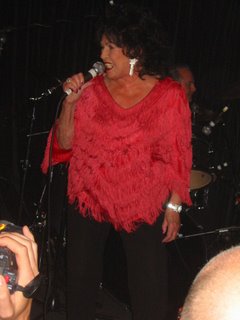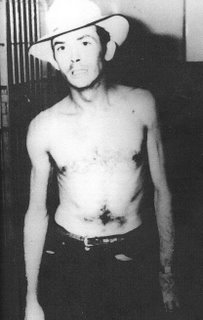
A moment from the Wattstax festival:
As Larry Shaw, vice president of advertising and publicity at Stax Records and assistant director of the movie version of Wattstax, gazes out across the Los Angeles Coliseum his face is etched with anxiety. To protect the Los Angeles Rams’ pitch the grass is off limits to the reported 112,000, largely African American, crowd packed into the stadium. Yet, despite security being provided by three black organisations (The Watts festival, The Sons Of Watts and the Watts Rangers) people are flooding onto the pitch.
Seven years earlier, in August 1965,
The difference between triumph and disaster is a small fifty-five year old showbiz veteran in a fuchsia pink safari jacket and short pants … The Prince of Dance, the funkiest man alive, the world’s oldest teenager: Mr Rufus Thomas!
Since 1965 all Stax notepaper had borne the legend The Memphis Sound. Thomas, as much as anyone, had helped conceive the sound of Memphis providing the first sizable hit not only for Stax records but also, in 1953, for Sam Phillips fledgling Sun label.
Billing himself as Rufus ‘Hound Dog’ Thomas Jr, Sam Phillips' legendary label enjoyed its first chart success with Bear Cat – a fun answer record to Big Mama Thornton’s classic Hound Dog.
“Me and Sam Phillips? We were tighter than the nuts on
The following year Presley hit his stride and it marked the end of Thomas’ recording career at Sun:
“When Presley and Carl Perkins and Cash came along just like he (Phillips) catered to black, he just cut it off and went to white.” Thomas remembered (Lost Highway: Peter Guralnick)
“I started actually as a tap dancer. That’s how my good timing came about. I was a tap dancer and I used to do some scat singing like Louis (Armstrong), you know all those kind of things. Really I did it all. If it came under the heading of show business I did it.”(Lost Highway: Peter Guralnick).
“Rufus had a partner called ‘Bones’ and they would warm up the audience with an act called ‘Rufus and Bones’. They were kind of a black Dean Martin and Jerry Lewis, with Rufus doing the straight lines and ‘Bones’ doing all kinds of crazy things.” (Waking Up In
After eleven years, and having witnessed most of the major players in black music at that time take the stage, Thomas left Amateur Hour in a dispute over money:
“I wanted more but I couldn’t get Bones to go ask for it with me. So the man got with Bones and asked him would he work with someone else…he said yes and I got fired.”(Lost Highway: Peter Guralnick).
Still Thomas had other irons in the fire including hosting another amateur show at the Handy Theatre, still with Bones, and perhaps more significantly broadcasting on WDIA The Mother Station of the Negroes.
In 1948 WDIA had introduced a policy of all black announcers playing mostly black music. A 1952 survey showed “that radios, once beyond the means of the average black family had become a standard appliance- in
It was in an attempt to reach that audience that Jim Stewart, head of Satellite (soon to be Stax) records first met Thomas in 1959 whilst pitching The Veltones Feel I’m In Love/ Someday at that point Satellites sole foray into R&B in a catalogue that included You Drive Me Crazy/Say Anything But Not Goodbye by Ray Scott who had authored Billy Lee Riley’s Flying Saucers Rock ‘n’ Roll.
In 1960 Jim Stewart leased the old Capitol Theatre on the corner of College and
Rufus was amongst the first people to arrive at the new studio and brought with him a tape of Cause I Love You, a song that he had written and that he and his daughter Carla performed as a duet. Stewart liked it enough to record it with Booker T Jones on baritone sax and Marvell Thomas, Rufus' son, on piano.
Cause I Love You/Deep Down Inside was issued in 1960 and it forever changed the direction of Jim Stewart’s label and life.
Stewart recalled “Prior to that I had no knowledge of what black music was about. Never heard black music and never even had an inkling of what it was all about. It was like a blind man who suddenly
Previous Satellite releases had met with indifference but this one actually sold. Indeed it sold well enough to bring Satellite to the attention of Jerry Wexler who leased the track for Atlantic records pop subsidiary Atco and led to a deal whereby
In 1963 Thomas delivered the track that would set the template for the rest of his career. The Dog was a dance craze record and was quickly followed by Walking The Dog and Somebody Stole My Dog. Although these had all been reasonable sized hits, by 1969 Thomas could have been forgiven for feeling a little neglected at Stax. As Rob Bowman notes in Soulsville USA: “ He had not been invited to go on the Stax /Volt tour of Europe in 1967, he was not asked to perform on the labels 1969 television special and his album, May I Have Your Ticket Please was not finished for the big LP push of spring 1969. He felt that many in the company did not take him seriously as an artist.”
In December of 1969, however, Thomas was put together with the producer Tom Nixon, whom Stax had recently recruited, and immediately the partnership hit with Funky Chicken. This was another dance craze record and the first in a series of records that saw the Nixon/ Thomas partnership chart six times. As Dean Rudland points out in his sleeve notes to The Funkiest Man, at fifty-three, Thomas was ”on the hottest streak of his career”.
It was this recent career revival that ensured Thomas’ presence at Wattstax . . .
When the crowd first start trailing onto the pitch at the end of Breakdown, Thomas lightly remonstrates with them:
“I don’t want nobody on the field – not yet. When I tell you to get on the field then you get on the field and I just might get on the field with you.”
Thomas then goes into the aforementioned Funky Chicken beginning:
“Y'all come on in now
Come right on down front
I got something I want to show you”
Maybe people take this to be the invitation that Thomas had teased them with because what had been a trickle of people turns into flood.
Al Bell, who by 1972 was effectively running Stax records and was the most senior label executive present at Wattstax, recalls:
“The only time I became concerned was when they started coming over the fences and coming out on the field because I didn’t know what that could possibly result in. And Shaw was concerned. I expressed it to Shaw, I said ‘Shaw I’m concerned right here, but the only way were going to get these people off this field is Rufus Thomas. Because Rufus Thomas can control the crowd so you (Larry Shaw) gotta go out there and tell Rufus to talk these people back off this field ‘cause he can do that or we’re gonna have to close the show down.”(Wattstax DVD commentary)
This is exactly what Shaw does, then tensely watchs, as Thomas begins. The music stops and a little hesitantly at first Thomas starts rapping: “Power to the people, let's go to the stands…” some in the stands echo him but it seems distant and half hearted. Nevertheless, the crowd on the pitch is starting to thin. Thomas spots a man waving an inside-out umbrella, more an act of high spirits than a threat, and spotlights him “He don’t mean to be mean he just wants to be seen” he mocks. It turns into a routine “Yeah that’s a brother alright, but I be damned if he be my brother”. Umbrella Man is now alone on the grass mugging trying to extend his moment, but it’s gone and only he doesn’t know it. Thomas has won the crowd, “Now y’all get him off” he orders and once more people flood the pitch but only to jostle Thomas’ anonymous stooge off the grass so the show can go on.
It’s the work of a master and, I suspect, a glimpse of Thomas the tent show minstrel. Only somebody drawing from a deep well of experience could have played a crowd so effectively.
As Al Bell says in his commentary to the DVD edition of Wattstax
“We could always be certain that when Rufus Thomas hit the stage as they say, quote, that he was gonna get the house and he got the house at Wattstax. I mean did he ever get the house at Wattstax! Get the house and control the crowd.”
After Wattstax things were never the same at Stax and the company collapsed in 1975.
Thomas recorded irregularly after the demise of Stax.
1996 saw a sort of bringing together of his two great dance craze songs when he recorded Chicken Dog with The Jon Spencer Blues Explosion. Its hard to believe, when listening to this track, that the former Rabbits Foot Minstral and oldest living teenager was 79 at the time of recording particularly when you hear, right at the start of the track, Thomas leering “I know where I’m going now”.
Further reading here.
In deference to the season you can listen to Rufus Thomas' I'll Be Your Santa, Baby here.
Happy Christmas.




